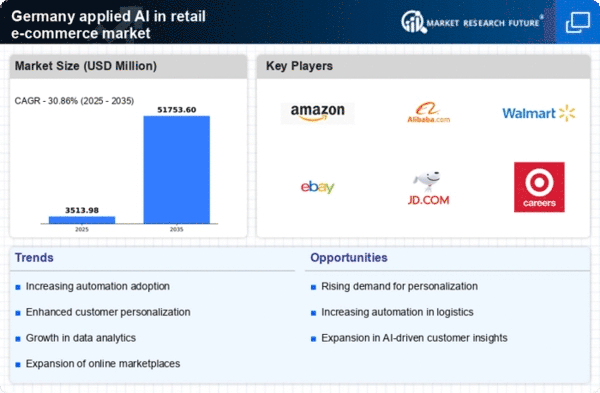Supply Chain Resilience
Supply chain resilience is increasingly recognized as a critical driver in the applied ai-in-retail-e-commerce market. In Germany, retailers are utilizing AI to enhance supply chain visibility and responsiveness. By integrating AI technologies, businesses can predict disruptions, optimize logistics, and manage inventory more effectively. Recent data suggests that companies employing AI in their supply chains have experienced a 30% reduction in operational costs. This resilience not only ensures timely product availability but also enhances customer satisfaction. As global supply chains face various challenges, the ability to adapt and respond quickly is becoming essential for success in the applied ai-in-retail-e-commerce market.
Dynamic Pricing Strategies
Dynamic pricing is emerging as a pivotal driver in the applied ai-in-retail-e-commerce market. Retailers in Germany are employing AI algorithms to adjust prices in real-time based on demand, competition, and inventory levels. This strategy enables businesses to maximize revenue while remaining competitive. For instance, studies show that retailers implementing dynamic pricing can increase their profit margins by as much as 20%. The ability to analyze market conditions and consumer behavior instantaneously allows retailers to respond swiftly to changes, thereby enhancing their market positioning. As the applied ai-in-retail-e-commerce market continues to evolve, dynamic pricing is expected to become a standard practice among leading retailers.
Enhanced Customer Insights
The applied ai-in-retail-e-commerce market is increasingly driven by the need for enhanced customer insights. Retailers in Germany are leveraging AI technologies to analyze consumer behavior, preferences, and purchasing patterns. This data-driven approach allows businesses to tailor their offerings and marketing strategies effectively. According to recent statistics, approximately 70% of retailers in Germany report that AI-driven analytics have improved their understanding of customer needs. By utilizing machine learning algorithms, companies can predict trends and optimize inventory management, thereby increasing sales and customer satisfaction. The ability to derive actionable insights from vast amounts of data is becoming a crucial competitive advantage in the applied ai-in-retail-e-commerce market.
Sustainability Initiatives
Sustainability is becoming a significant driver in the applied ai-in-retail-e-commerce market, particularly in Germany. Retailers are increasingly adopting AI technologies to optimize resource usage and reduce waste. For example, AI can analyze energy consumption patterns and suggest improvements, leading to cost savings and a smaller carbon footprint. Approximately 60% of consumers in Germany express a preference for brands that demonstrate a commitment to sustainability. This consumer trend is prompting retailers to integrate sustainable practices into their operations, which can enhance brand loyalty and market share. As sustainability becomes a priority, the applied ai-in-retail-e-commerce market is likely to see a growing emphasis on environmentally friendly practices.
Automation of Customer Service
Automation is a key driver in the applied ai-in-retail-e-commerce market, particularly in customer service. In Germany, retailers are adopting AI-powered chatbots and virtual assistants to enhance customer interactions. These technologies can handle inquiries, process orders, and provide personalized recommendations 24/7, significantly improving operational efficiency. Reports indicate that businesses utilizing AI in customer service have seen a reduction in response times by up to 50%. This shift not only enhances customer experience but also allows human agents to focus on more complex issues. As automation continues to evolve, it is likely to play an increasingly vital role in shaping the future of the applied ai-in-retail-e-commerce market.
















